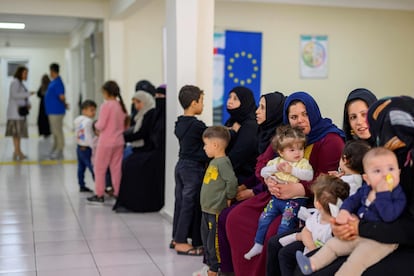Xenophobia grows in Turkey: Ten of thousands of deportations and human rights violations
Activists, lawyers and inmates report dire conditions in internment centers paid for by the European Union


Economic crisis and the xenophobic narratives of media outlets and political parties — primarily among those linked to the opposition — have spurred anti-immigrant sentiment in Turkey. With next March’s municipal elections in mind, which will determine the next administration of major cities like Istanbul and Ankara, current president Recep Tayyip Erdogan has strengthened immigration laws, and authorized massive detentions that have captured and deported tens of thousands of foreigners. These operations, according to denouncements from lawyers and activists, fail to respect basic human rights.
“We are frightened. Many of us stay locked in our homes, but to pay rent you must go out and fight. The problem is, if you leave your home, you don’t know if you will return,” says a Nigerian pastor, who requested anonymity due to the sensitivity of the situation. The majority of his peers in Turkey, he explains, earn their living through buying products that they send to their home country for resale. But every time they go to the markets, the resale vendors run the risk of being stopped at one of the new mobile police checkpoints. These are part of the new interior minister Ali Yerlikaya’s plan to combat irregular immigration, which began this summer in Istanbul and is being extended to Turkey’s other major cities. “There are checkpoints in the markets, in the bus and metro stations. And the arrests are massive. There are so many Nigerians in the deportation camps. Many of them are legal residents, but they can’t renew their visas, or they are not being approved,” says the pastor.
According to statistics from the interior minister, since mid-June, 112,000 undocumented foreigners have been detained, of which 48,000 have been deported. Lawyers and activists consulted for this article stress that among the detained are asylum-seeking individuals, people who are in the process of renewing their residency permits and even those whose documentation is in order. In addition to those who have been deported, a large number of foreigners have left Turkey in recent months in the face of ever-growing obstacles to renewing immigration permits. “Thanks to our exhaustive immigration laws — and this is really good news —120,531 foreigners whose visas or residency permits had expired have left our country, knowing that we were going to detain them,” celebrated Yerlikaya on October 12.
“These operations to combat irregular immigration focus on effective in-country apprehension and the establishment of an efficient and expeditious deportation mechanism,” a source from the interior minister of Turkey tells this newspaper. The objective, they affirm, is to “reduce the pressure of irregular immigration” and “create a deterrent effect.”
Turkey is now home to 1.13 million foreigners with residency permits, 225,000 less than at the beginning of the year, according to official numbers. The total number of people under international protection (Iraqis, Afghanis, Ukrainians) has also fallen by 20,000 to 287,000, and the number of Syrian refugees — who enjoy special status — has gone from 3.75 million to 3.25 in just a year and a half.
“What happened to those half million Syrians who have disappeared?,” asks Syrian Turkish activist Taha Elgazi. The answer, he says, is that some are still in the country, living without proper documentation, others have emigrated irregularly to Europe and others have returned to Syria, “forced by circumstances” and the “government’s pressures” such as laws that bar them from living in certain neighborhoods or provinces. “Discrimination and racism have increased recently, especially against Syrians. There have also been violent attacks, and people have become frightened,” he reports.
More than 50 Latin Americans detained or deported
“It’s crazy,” complains a Latin American diplomat. According to data collected by this newspaper through diplomatic sources, more than 50 Latin Americans have been detained and deported — or are in the process of being deported — including several Venezuelan students with ministry of education scholarships who were removed despite embassy attempts to stop the process. “Recently, they detained the father-in-law of one citizen and deported him. Ultimately, he decided to leave the country because he was afraid that they would deport him as well,” explains another diplomat. In one well-known case, two Moroccan tourists who had legally entered Turkey were detained last August, and were deported to northern Syria because Turkish authorities thought they were from that country.
“The Turkish interior minister has clearly indicated that his intention is for Turkey to no longer be a transitory country [for migrants] because it often turns into a destination country,” explains the EU ambassador in Ankara, Nikolaus Meyer-Landrut, in an interview for EL PAÍS. He explains that the EU is maintaining contact with Turkish authorities to “update” their 2016 anti-immigration agreement.
This pact, which turned Ankara into the guardian of the EU’s southeast border, was able to reduce the arrivals of migrants and refugees via Turkey to European territory, sending them instead towards the central Mediterranean. It also turned Turkey into the country with the world’s highest number of refugees (3.5 million). Still, that number barely exceeds 7% of the country’s population, even including its estimated two million irregular migrants.
However, immigration has been a focal point in Turkey’s public discourse in recent years. The media has played a role in fostering an escalating sense of xenophobia, publishing articles that attribute economic issues, the rise in internet scams, and soaring housing prices to foreigners, despite their relatively low representation (only 3% to 4% of buyers, in contrast to over 15% in Spain).
Rosa Martínez and her boyfriend, Adrián Cuadrado, have their paperwork in order. Both of them — their names have been changed for fear of repercussions — arrived to Turkey from Cuba four years ago in hopes of “working and having a family in peace, comfortably.” “We took on debt to leave Cuba and have worked here in aesthetic clinics [the flourishing Turkish industry of hair implants and other plastic surgeries that employs numerous migrant workers as translators.] After three years of working to pay off our debts, when we began to live, the problems started for migrants,” Martínez laments.
In February, she says, they moved to a new apartment. But its owner began to harass Martínez and after she repeatedly refused his advances, he reported her boyfriend to the police. “We locked ourselves up at home until the authorities came. Even though we showed them that the report was false, they took my boyfriend away. The thing is, they’re using any reason at all to take foreigners to a detention center,” Martínez says. Ebru Bese, an immigration lawyer, confirms that he has encountered numerous cases in which any excuse was used, even reports and complaints with no evidence, to detain foreigners and revoke their residency status.
Over the next two and a half weeks, Adrián Cuadrado “disappeared.” No one knew where he was, no one could communicate with him, and the authorities did not offer any information as to his case. By the time the Cuban was able to get in contact with his partner, he had spent time in two detention centers: one close to Istanbul and another in Kayseri, 780 kilometers away.
“We don’t know where some people are,” explains Irfan Güler, a lawyer who specializes in this kind of case. “They usually bring them to Tuzla [a municipality in the outskirts of Istanbul], and from there to eastern cities like Erzurum or Agri [more than 1,200 kilometers away.] It is a deliberate policy to hinder the work of lawyers, and to prevent us from appealing deportation decisions in time.”
Centers financed by the EU
In Turkey there are 28 deportation centers spread throughout the country, 14 of them built and another seven renovated with money from the EU in accordance with the 2016 anti-immigration agreement. The institutions operate as prisons, where foreigners are imprisoned awaiting their removal from the country, and inmates “have less rights than a common criminal,” according to lawyer Gülden Sönmez. “If a Turkish citizen commits a crime, they can be held in police custody for a maximum of 48 hours, and then they must appear before a judge. But if you’re from another country and you have committed no crime, you can be locked up for months, without access to translators or lawyers.”
“They haven’t killed or robbed anyone, and they are in a prison where they are mistreated, beaten, and humiliated like dogs. They spit on them, they make them sleep next to feces. My partner was in a cell with more than 15 other prisoners, two to a mattress on the floor and with only one toilet for everyone in the cell,” says Rosa Martínez. Attorney Ebru Bese of Ankara bar association confirms that the institution has received reports of terrible conditions in the deportation centers, including mistreatment, torture, rapes and suicides. “But we have not been allowed access to investigate, there is so much opacity,” he says.
The EU ambassador acknowledges being aware of the allegations regarding the detention centers, but counters that “the EU has financed training courses for migration management capacity building and so that asylum processes are compatible with international legislation and human rights,” and that “the centers are run by Turkish authorities.” The source in the interior ministry, for their part, denies that such abuses take place and maintains that in the centers, “irregular immigrants are housed with human dignity” and “their basic needs are satisfied.” “Our principal objective in reducing the time that irregular immigrants spend in the center is to guarantee speedy deportation procedures,” they add.
After being locked up for four months—during which his residency permit expired and he was unable to renew it—and seeing that neither his lawyers’ actions nor the efforts of the Cuban embassy had any effect, Adrián Cuadrado decided to sign the form for voluntary deportation. In mid-October, he was sent to the Istanbul airport to board a plane to his country (that had to be paid for by his partner.) The lawyers and activists contacted for this article believe that the prolonged confinement and treatment experienced by detained foreigners constitute a strategy aimed at getting them to sign deportation documents. “They are forced to sign the voluntary deportation form, and those who refuse are subjected to mistreatment,” says Bese.
Sign up for our weekly newsletter to get more English-language news coverage from EL PAÍS USA Edition









































